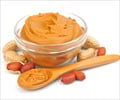A US expert writing in The Lancet medical journal said a form of immunotherapy that could get rid of a person's allergy to peanuts is likely within five years.
A US expert writing in The Lancet medical journal said a form of immunotherapy that could get rid of a person's allergy to peanuts is likely within five years.
Peanut allergy, a condition that is on the increase, mostly appears in the first three years of life. Symptoms of peanut allergy include skin reactions such as hives, itching around the mouth and throat, diarrhea, stomach cramps, nausea, vomiting, shortness of breath, wheezing and, in severe cases, anaphylaxis—a life-threatening medical emergency.Peanut allergy is known to affect about 1 percent of children under age of 5. In the past 15 years more children have been diagnosed with the condition.
As children grow they get over other food allergies such as milk or eggs, but only about 20 percent lose their peanut allergy.
Dr. Wesley Burks, a food allergy expert at Duke University Medical Center in Durham, North Carolina, said in a telephone interview, "I think there's some type of immunotherapy that will be available in five years. And the reason I say that is that there are multiple types of studies that are ongoing now."
“Ideally, such a therapy would change a person's immune response to peanuts from an allergic one to a nonallergic one,” Dr. Burks added.
According to Dr.Burks, using engineered peanut proteins, as immunotherapy is one solution to the problem. Other possible approaches include the use of Chinese herbal medicine that is showing promise in animal research.
Advertisement
He however added that because several peanut proteins were involved in the allergic response, the new modified peanut that resulted from a complicated process of altering enough of the allergens causing an allergic reaction would probably no longer be a peanut.
Advertisement
He cited statistical data showing an increase in the condition that has doubled among young children from 0.4 percent in 1997 to 0.8 percent in 2002 in one U.S. study.
Though there are no clear reasons to explain why peanut allergy is becoming more common, Dr. Burks said "hygiene hypothesis" was a possible theory.
According to this theory, too little exposure to infectious agents in early childhood can raise one's susceptibility to allergic reactions.
Other studies have suggested that if a pregnant woman eats peanuts, her baby has a higher risk of becoming allergic.
Source-Medindia
THK/L











